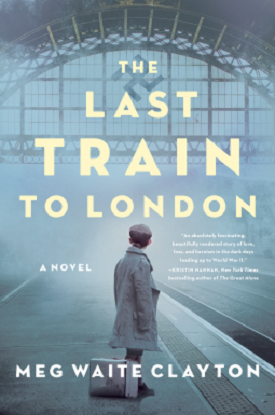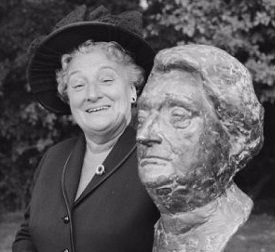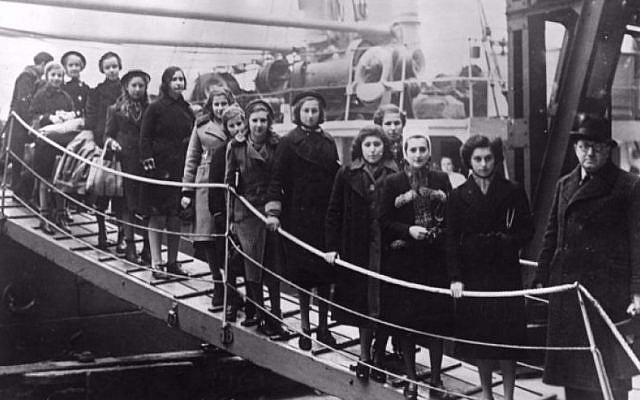 Synopsis:
Synopsis:
The Last Train to London focuses on the Kindertransports by which thousands of innocent children were secreted out of Nazi-occupied Europe and the brave, dedicated woman who helped them escape to safety.
When the story opens, it is 1936. Thus far, the Nazis are merely loud, brutish bores in the eyes of fifteen-year old Stephan Neuman, the son of a wealthy and influential Jewish family. His father owns and operates a chocolate company and Stephan is a budding playwright whose playground extends from Vienna’s streets to its intricate underground tunnels. Stephan is protective of his little brother, Walter, and. sadly, their mother suffers from terminal bone cancer.
Stephan’s best friend and companion is Žofie-Helene, a brilliant mathematician and Christian. Her mother, Kathe Perger, is a journalist dedicated to the truth — the editor of the progressive, anti-Nazi newspaper, the Vienna Independent.
Their innocence is shattered when the Nazis invade and take control of Austria.
Truus Wijsmuller, known as Tante Truss, is a member of the Dutch resistance who risks her life smuggling Jewish children out of Nazi Germany to safety in nations that are willing to accept them. The mission becomes increasingly dangerous after the Anschluss —Hitler’s annexation of Austria — and European countries close their borders to the growing number of refugees who are desperate to escape.
Tante Truus is determined to save as many children as she possibly can. And after Britain passes a measure declaring that it will admit at-risk child refugees from the German Reich, she dares to approach none other than Untersturmfuhrer Adolf Eichmann. The author of a paper entitled “The Jewish Problem,” Eichmann eventually helped devise the “Final Solution to the Jewish Question.” (After World War II, he was executed for his crimes.)
Tante Truus finds herself in a desperate race against time to deliver Stephan, Walter, Žofie-Helene, and several hundred other children to their uncertain future abroad.
Tante Truus proves that hope survives even in the deepest darkness.
Review:

It is a story about a time that must never be forgotten. Ironically, it is a contemporary reminder of just how quickly matters can escalate — with draconian consequences.
Clayton’s story begins in December 1936 which she refers to as “The Time Before.” Stephan dreams of being a playwright and Žofie-Helene has already proven herself a brilliant mathematician who is receiving private tutoring. Along with their friend, Deeter, the three dream about their futures as they practice acting out Stephan’s characters. They are innocently and blissfully unaware that since 1933 Truus has been using cheap replicas of her jewelry and other tricks to smuggle children past Nazi soldiers into Amsterdam, assisted by Klara Van Lange, her dedicated but naive apprentice. She and her devoted husband, Joop, have suffered the heartbreaking loss of several unborn children. And although they would like nothing more than to raise their own child, Truus is fully cognizant of the risks she takes in order to shepherd little ones to freedom and that her absences from home, coupled with the danger she faces, would force her to abandon her efforts.

You have never taken a child from her mother’s arms. I cannot imagine there exists a more horrible task on this earth.
Matters worsen dramatically for Stephan and his family after the full-scale takeover of Austria by the Nazis. His family is displaced from their palatial home, their company taken from them, and they suffer other devastating losses as they struggle to simply survive. He wonders, “How could this not be a nightmare? How could he not be sleeping, about to wake up, still in his pajamas, to go to his desk and his typewriter, to capture the nightmare before he lost the details that might make a story if only this weren’t real?” Žofie-Helene, along with her younger sister, Johanna, and their grandfather, Herr Perger, the barber, face their own challenges. Žofie-Helene’s mother, like so many other journalists, learns that as Hitler convinces all of Germany that his lies are the truth and the truth is a lie, there is a price associated with truth-telling.

The movingly terrifying stories of Truus, and Stephan and Žofie-Helene, do not immediately intersect. By the time they do, Clayton has fully immersed readers in their narratives, ensuring readers’ investment in their fates. Truus is not fearless. On the contrary, she is wise and savvy enough to understand the stakes and proceed with cautious determination. She observes, “My father used to say courage isn’t the absence of fear, but rather going forward in the face of it.” She well knows that the contingency for which one fails to plan is the one that can bring defeat.
Stephan, like the other young people who witnessed the atrocities of the time, matures quickly as he sees what is happening to his country, his family, and the reactions of those around him. He quickly appreciates the depth of betrayal by his fellow citizens and friends as he finds himself caught up in a demonstration where those around him are chanting “One People! One Reich! One Fuhrer!” and he realizes that those “words might well echo through Stephan’s head for the rest of his life.” Clayton’s portrayal of Stephan’s coming-of-age is chillingly realistic and heartbreaking. Žofie-Helemeane must likewise come to terms with the evaporation of the future she envisioned and staggering loss.
And at the heart of the story is the triumph of Truss who, like so many others, is bewildered by what is happening around her. “Where are the decent German people? Why aren’t they standing against this? Where are the leaders of the world?” But there is no time to await answers because she is challenged by none other than Eichmann himself. And unwilling to accept defeat. With the assistance of many other brave souls, the mission is a success, but not without concomitant costs.
The Last Train to London tells but one of the many stories of heroism, bravery, and dedication that ultimately brought defeat to the Nazi regime. Clayton’s approach to her subject matter is measured and successful. She demonstrates the impact of history upon her characters with restrained realism which illustrates the depth of their extraordinary resilience and commitment to those they love and the tasks history has assigned to them. Truus is deeply conflicted, questioning why she cannot carry a child to term and feeling that she has let her husband down. She declares, “I’m a woman who can’t bear a child in a world that values nothing else from me!” even as Joop assures her that she is “a woman doing important work, in a world that badly needs you.” Eventually, in Clayton’s handling of her story, Truus finds peace in her fate. “Perhaps this is why God chose to deny us children. Because there would be this greater need, this chance to save so many. Perhaps He saved us the burden of having to choose to risk leaving our own children motherless.”
Nearly 10,000 children were ultimately saved by Kindertransports — placed on trains by parents and grandparents most never saw again who hoped their beloved children and grandchildren would be spared. Tante Truus, the woman who did not bear children of her own, is today revered by the children she saved and their descendants. The Last Train to London is powerful, compelling, and absolutely heartbreaking — at certain junctures, extremely difficult to continue reading. For that reason, it is a book that needs to be read because it is also full of hope, power, and strength. It is a beautifully crafted reminder that one person can make a difference.
Enter to Win a Copy of The Last Train to London
NOTE: The book may only be mailed to a United States address.



28 Comments
Thanks for the chance to win The Last Train To London. Looks like a book I would really enjoy.
This sounds really great. Thanks for the time you spend to provide such a well thought-out review! This is definitely one I want to check out.
The thing I find most compelling about this book is that parents actually sent their children away in good faith, not knowing when they would see them again or even IF they would see them again. I can’t imagine how terrifying that must have been.
This captivating, memorable and unforgettable story is meaningful, and shows how the courageous individuals realized that the children’s lives were in peril and risked their lives in order to give them freedom and a future. Many were brave and could not stand by when the atrocities took place.
I love that within this story there are many different stories of various acts of heroism and bravery!
I love the cover art. Those old European train stations are so beautiful. Thanks for the chance to win a copy.
The most compelling thing I think, for me, is the guts and gumption it took for Truss to decide to save as many children as she could, and then to do everything possible to follow through on that decision.
Love the cover!
I’m dreaming of getting lost in this book
I love historical fiction, particularly WWII era, and this story, about people saving children from the Nazis, sounds like a tragic yet heartwarming story.
Haven’t actually read the book but I like reading WWII-era historical fiction.
My kind of story: where history and fiction intersect!
This story really interests me.I love reading about this time period and learning new things about what went on behind the scenes.I have heard of the Kindertransports but haven’t read anything about them yet.
Interested in that sad time.
Love reading historical fiction, especially when it relates to WWII and the Holocaust. It’s heartbreaking but such an important part of history. I would really love to win a copy. Thank you for the chance!
How scary it must be sending some one away not knowing if you`ll ever see them again
The premise of this sounds extremely intriguing, as I was not aware of these types of escorts available to move people out of German occupied areas to safety but definitely sounds like it will be a really good historical fiction!
I find it most intriguing (and heartwarming) that strangers would risk their lives to save the children from the horrors they faced, and that parents had to trust them completely to get their children to safety. I have heard about the kindertransports and would love to read this book to find out more details. Thank you for the opportunity!
Sounds really good! Added to my Goodreads list.
Love historical fiction. The bravery surrounding this story sounds so inspiring! Thank you!
I love historical fiction. I especially am interested in reading about parents sending their children away on blind faith not knowing if they will ever see them again. I don’t know if I could do that. I would definitely love to read and review. Thank you for the chance to win this book.
What was most compelling to me was that rather than be angry and bitter about not having her own children, she turned to saving others Instead.
I love reading Historical Fiction based around WWII. I love to read about the many men and women that sacrificed their lives to save many other.
I like the idea of hope and heroism shining through a dark time.
Historical fiction — what’s not to love? — and during dark times.
Thanks for the chance. This sounds like a great book. What’s so intriguing to me is all the people who had to come together of a like mind to make sure these kids could get away and survive
I love history, so I am drawn to the entire story & this book will be reread quite a bit.
I think that it shows how brave the parents were to send their children away without knowing if they would ever see them again.